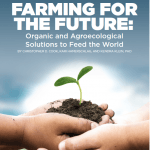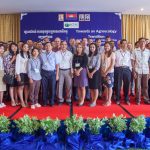15 downloads
Title of document: Farmer Field School Guidance Document: Planning for quality programmes Authors: Food and Agriculture Organization of the United Nations Ministry/Government Agency/Organisation: Food and Agriculture Organization of the United Nations Year of publication: 2016 Geographic focus: Global Url original document: https://www.google.la/?gws_rd=cr&ei=wzpZV9G3Cp6UvQTSr6CwAQ#q=Farmer+Field+School+Guidance+Document:+Planning+for+quality+programmes+ Summary: Every day we learn more about the global challenges facing food production : global warming, extreme weather, intercontinental invasions by pests and diseases, land degradation and water loss from over-exploitation, and price volatility. Farming, fishing and agroforestry systems are becoming more complex, but we are also learning how local agro-ecosystems provide the underlying services - soil nutrient cycling, pest and dideases regulation, water capture and storage, pollination, genetic resources conservation, coastal protection for aquatic species and from storms that enable farmers to adapt to those challenges. Read More
1 download
Title of document: Farmers’ Voices Authors: NAFES Ministry/Government Agency/Organisation: MAF Year of publication: 2010 Geographic focus: Laos Url original document: http://laocs-kis.org/resources/farmers-voices-2010/ Summary: What do the farmers of Laos talk about when they get together? What are farmers saying about environment and rural livelihood? What do they consider to be their most valuable assets? What are their most trusted sources of advice? What do they think about the changes taking place around them? And what type of future do farmers want for themselves and their family? Read More
9 downloads
Title of document: Multiple pathways: Case studies of sustainable agriculture in china Authors: Qiao Yuhui, Qi Gubo, Seth Cook, Lila Buckley, Song Yiching, Zhang Yanyan, Zhang Li, He Xueqing, Friederike Martin, Yue Shizong and Wang Zhen. Ministry/Government Agency/Organisation: IIED Year of publication: 2015 Geographic focus: China Url original document: http://pubs.iied.org/17579IIED Summary: Chinese agriculture currently faces major environmental challenges. China’s applications of fertilizers and pesticides are among the highest in the world, which in turn has negative impacts on human health and environment. Soil erosion and soil pollution are widespread, as is the loss of agricultural biodiversity as high-yielding hybrid crop varieties replace traditional landraces. Water scarcity affects many parts of the country, as evidenced by plummeting water tables in northern China. Meanwhile, food safety risks – exemplified by a series of well-publicized incidents such as the 2008 milk-melamine scandal are a source of great public anxiety. Read More
6 downloads
Title of document: Study of farmer experiences and approaches with mechanised dry direct seeding in Savannakhet province Authors: Liz Clarke, Tamara Jackson, Khamlouang Keoka and Viengsavanh Phimphachanvongsod Ministry/Government Agency/Organisation: CIAT Year of publication: 2016 Geographic focus: Laos Url original document: https://www.researchgate.net/publication/299627239_Study_of_farmer_experiences_and_approaches_with_mechanised_dry_direct_seeding_in_Savannakhet_province#pf3 Summary: Mechanised dry direct seeding (DDS) is a crop establishment technique that reduces labour requirements, and offers flexibility in terms of earlier planting times. This technique has been tested for many years in southern Lao PDR, including more recently by several research and development projects concurrently in Savannakhet province, and there has been a trend of increasing adoption among farmers. In this province in the wet season of 2015, over 800 ha was planted using the DDS technique, in comparison to around 80 ha in the previous year. This rapid increase requires an understanding of the motivations, experiences and outcomes for farmers, in order to understand the innovation process, and to identify methods to support the uptake and outscaling of this technique. Read More
18 downloads
Title of document: Climate Resilient Agriculture: Educational/Training Posters Series Authors: Julian Gonsalves Ministry/Government Agency/Organisation: CIAT Year of publication: 2016 Geographic focus: Southeast Asia Url original document: https://ccafs.cgiar.org/publications/climate-resilient-agriculture-educationaltraining-posters-series#.V01EUiGwEgg Summary: These posters are based on key messages derived from a sourcebook of reading/reference materials in a companion production entitled "Towards Climate Resilience in Agriculture for Southeast Asia - An Overview for Decision-makers". They were produced by CIAT with CCAFs funding for an FP1.1 project entitled “Integrated agricultural technologies for enhanced adaptive capacity and resilient livelihoods in climate-smart villages (CSVs) of Southeast Asia”. These posters are designed for use in training or educational events, primarily for starting discussions on important issues facing agriculture in a changing climate. The poster series cover a range of topics/ issues related to climate change in agriculture.They can be used one at a time, and not necessarily in any particular sequence. These pictures can also be enlarged to serve as educational posters, displayed one at a time. They can be used in power point presentations . The illustrations can serve as prototypes for local adaptation and further improvement by local artists. Any use of the illustrations should provide adequate credits to the source Read More
9 downloads
Title of document: Crop protection and pesticide risk assessment Myanmar: towards sustainable agricultural and export of high value crops Authors: Peeters, F.M.; Meggelen, J. van; Schepers, H.T.A.M. in Alterra Report Ministry/Government Agency/Organisation: Year of publication: 2015 Geographic focus: Myanmar Url original document: https://www.wageningenur.nl/nl/Publicatie-details.htm?publicationId=publication-way-343835323638 Summary: The government of Myanmar and the Netherlands intend to start a partnership programme in different agricultural sectors, including horticulture. The Dutch Ministry of economic Affairs has fielded a technical expert mission in October 2014 to assess the potentials for growth and development in the vegetable, fruit and flower sub-sectors. In this context the Dutch ministry of Economic Affairs aims to assist Myanmar towards sustainable agricultural production and increased exports of high value crops. Investment in an integrated programme on Plant Health, including Integrated Crop Management and Pesticide Risk Reduction will result in an improved balance between benefits and risks of agricultural production in Myanmar. An expert team of the Netherlands existing of experts of Alterra and PPO of Wageninggen-UR and the NVWA have visited Myanmar (3-8 November, 2014). The objective of their mission was to provide clear strategic and operational directions for further development of an Integrated Crop Management and Pesticide Risk Reduction programme in Myanmar. Read More

10 downloads
Title of document: FARMING FOR THE FUTURE: Organic and Agroecological Solutions to Feed the World Authors: CHRISTOPHER D. COOK, KARI HAMERSCHLAG, AND KENDRA KLEIN Ministry/Government Agency/Organisation: Friends of the Earth Year of publication: 2016 Geographic focus: World / USA Url original document: http://webiva-downton.s3.amazonaws.com/877/05/5/8492/2/FOE_Farming_for_the_Future_Final.pdf Summary: Hunger is not primarily a problem of overall supply of food, but rather of poverty, lack of democracy and unequal access to land, water and other resources, especially for women, states a new report on organic and ecological solutions. This report cites that four decades of scientific evidence show that agroecological farming is the most effective agricultural response to the environmental challenges that threaten our future food security, such as climate change, soil erosion, water scarcity and loss of biodiversity. The report debunks three dominant myths about food, farming and hunger that keep society on the path of business as usual and offers agroecological solutions for a more sustainable and just foundation for our food future. It cities extensive evidence of the agroecology’s successin reducing poverty and producing ample harvests while protecting human and ecological health in both developed and developing countries. Read More
9 downloads
Title of document: Case study on Bamboo marketing in Lao PDR Authors: Latsamy Boupha, Phongxiong Wanneng, Bouakhet Sayasouk, and Bouavieng Souphanthong Ministry/Government Agency/Organisation: ICRAF/NUOL Year of publication: 2006 Geographic focus: Laos Url original document: https://www.google.la/?gws_rd=cr&ei=oAE0WN6UDMfsvATvrKewDw#q=Case+study+on+Bamboo+marketing+in+Lao+PDR Summary: Bamboo is non timber forest product, which can found in the tropical and sub-tropical zones. It is fast growing and easy regeneration species. Bamboo is a desirable plant for sustainable management; it has important direct and indirect economic and environmental benefits such as providing shoot for food, culms for housing, furniture, handicraft products and soil and water conservation. Bamboo can play an important role in the reduction of wood consumption, environmental and forest protection, poverty alleviation and sustainable development of rural economy. Read More
3 downloads
Title of document: Myanmar’s Agriculture Sector: Unlocking the Potential for Inclusive Growth Authors: David A. Raitzer, Larry C.Y. Wong, and Jindra Nuella G. Samson in ADB Economics Working Paper series Ministry/Government Agency/Organisation: ADB Year of publication: 2015 Geographic focus: Myanmar Url original document: https://openaccess.adb.org/bitstream/handle/11540/5300/EWP_470_MYA%20Agriculture_14Dec_WEB.pdf?sequence=1 Summary: Myanmar’s agriculture sector offers substantial unexploited potential to underpin the country’s inclusive economic development. With extensive land, water, and labor resources, as well as proximity to fast-growing markets, the country’s agriculture has key competitive advantages. At the same time, Myanmar’s agricultural productivity trails its neighbors as a result of constraints in input markets, infrastructure, and institutions. Key actions to address these constraints include improving land tenure, expanding credit availability, investing in input markets for nutrients and machinery, developing drainage and irrigation systems, and enhancing rural transport and electricity connectivity. In the short-term, public-private partnership may help to address these barriers to investment, but increased public investment in innovation and attention to climate change effects as part of comprehensive long-term agricultural development planning. Read More

27 downloads
Title of document: Proceedings of the national multi stakeholder workshop on Agroecology Transition, Cambodia Authors: Lucie Reynaud, Pierre Ferrand and Dr Saythong Vilayvong Ministry/Government Agency/Organization: ALiSEA Year of publication: 2016 Geographic focus: Cambodia This report presents the main findings of the discussions held during the 2 days workshop addressing the agroecology transition in Cambodia in Phnom Penh on the 30th and 31st of March 2016. Read More

 Asia & Mekong Region
Asia & Mekong Region  Cambodia
Cambodia  Laos
Laos  Myanmar
Myanmar  Other
Other  Vietnam
Vietnam